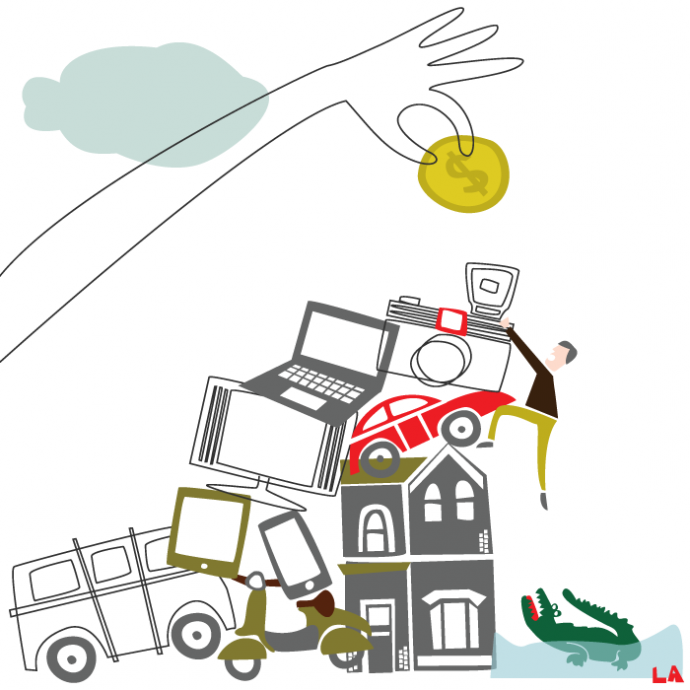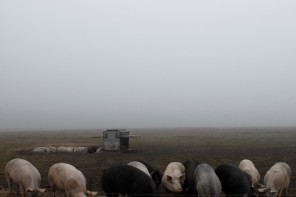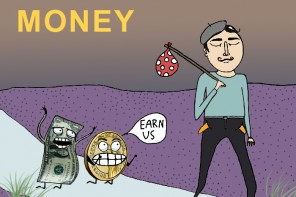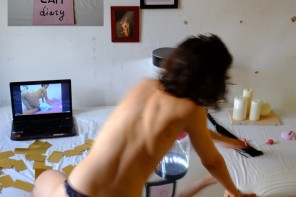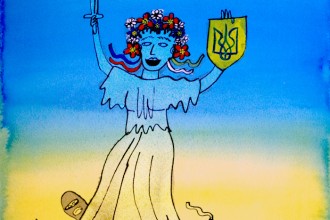Our consumerist society can dictate a lot of what happens in our lives, from the vocations we choose, the places we live, and the social groups we affiliate ourselves with—even if we prefer the idea that this is not the case. Regardless of the individual and their personal relationship towards money, most people would not and cannot live without it. But who has ever really considered the effect that our consumer culture has on the environment, and on the people whose shoulders this culture is standing on? Sensa Nostra speaks to the founder of LebensmittelRetten.de, Raphael Fellmer, who has been living without money on a ‘consumer strike’ for the past four years.
I guess it’s not that most people like money, but they like the idea that with money they can buy whatever they want. But once you don’t have this desire anymore to buy whatever you want, because you just consume with or without money what you need and not what you think you need, then you feel free. You have a house, food, mobility, everything is free.
I was born here in Berlin. In my early twenties I spent some time in Mexico helping the community there. This is when I began to discover the possibility of travelling the world on a low budget. I really wanted to see as much as possible from other cultures, to get inspiration and to understand more about how we are all related to each other.
After a lot of travelling I enrolled at The Hague University in the Netherlands in 2006 to study European Studies. There I met two beautiful friends, Benji and Nicola, and together we founded an NGO to promote better consciousness about how we are all related to climate change, injustice, starvation, and many other issues that we have today in the world which are not so balanced.
I believe in destiny. I believe sometimes, some things happen that change your life in a certain way which was meant to be. In 2009, in what felt like more than just a coincidence, I received two separate wedding invitations from two different couple friends in Mexico. At that time I didn’t want to go to Mexico, but since it seemed so predestined that I invited Benji and Nikola and said, “Let’s make this a sustainable journey.” We decided to hitch-hike the whole of the trip without any money: by boat, cars and trucks, all the way from The Hague to Mexico.
We set off in January 2010. From the Netherlands we went down to Spain, then to Morocco and the Canary Islands. There we found two Italians with a boat who could take us to the other side of the ocean to Brazil. From there we headed north to French Guiana, Venezuela, Colombia, all of Central America, until we arrived eleven months after we’d started in Mexico. We had missed the wedding by six months but it didn’t matter. I could reflect on all the beautiful emotions and all the gifts we had received from people along the way.
With this money-less journey we wanted, on the one hand, to focus on the surplus we have of goods: food, free car seats, partially occupied homes. On the other hand, we wanted to show how good humanity is. Life is really about having a little more faith and trust in your fellow human being, and not having fear of foreigners or strangers—even if we occasionally met people who told us they were involved in criminal acts.
There was helping out and then there was helping out—it was overwhelming at times. People let us sleep in their houses, shared their food, their time and curiosity, and they motivated us to continue. They never asked for anything in return, even if we sometimes offered our help. It was clear: we asked for a ride, and not afterwards we clean your car. This giving culture in Europe, we’re not used to it. When somebody is too good to us we think that there is maybe a trick, that he or she really wants something back. We had to learn to accept and appreciate without having a fear of imbalance.
It helped me to reflect on everything, and to ask myself, “Why do we have this organisation?” Why do we have to apply for money from the European Union? Look for people, food, locations, in order to spend it. Why didn’t we just make the direct connection? If I need a venue, I ask for the venue for free. When I need food, clothes or materials, I take the stuff which is already there. I really felt like it wouldn’t make any sense for me to enter back into the monetary system.
When we found out that my wife, who had joined us later in the journey, was pregnant, we returned to Europe and settled down in Berlin. Right now we live with another family who is renting a house. Because of our cause, they wanted to support us, and invited us to come and live there with them for free.
I decided to rename my moneyless lifestyle a ‘consumption strike’. One goal was really easy and simple: to reduce my own carbon footprint to the minimum I could feel comfortable with. I chose not to fly anymore, to eat vegan, and also to rescue and use all the food which is thrown away into the bins of supermarkets. It’s called dumpster diving. I had watched a documentary where people were getting food this way, and I thought, “that’s not possible, that cannot be the case.” The next day I went out to the bins and I found food.
Different things shocked me about the food I found. I thought, “What is this? How is it possible that human beings throw away something edible into the bin? How is it possible that other organisations are not picking it up? What a bad system this is.” The sheer mountain of food and the variety… We found not only food, but perfumes, shampoos, computers, all in good shape. Sometimes one or two thousand euros worth of goods, which had only just expired or not expired at all. That was just insane.
I was out almost every night alone. I only went to the organic supermarkets, so for sure when I rescue food, it’s always the best food. We were eating like kings, better than all of our friends. We had so much food that I could give it to neighbours and people on the street.
After some time, I contacted Bio Company, the leading organic supermarket chain in Berlin, and asked them if we could start a co-operation together where I’d go to a store, sort the food which would have otherwise been thrown into the bins into what is still edible and what is ready for composting, and then redistribute it. I managed everything, and after almost a year, other cities joined in. I couldn’t manage everything anymore, so I was really happy when I found a beautiful soul, a programmer from Cologne called Raphael, who set up a system which is today LebensmittelRetten.de, a voluntary platform which is completely non-dependant on money. We have three thousand people working voluntarily, picking up from over five hundred stores in Germany and Austria. Other conventional supermarkets, as well as bakeries, markets, cafes, and canteens are now in co-operation with us too. We are developing the system to launch this summer internationally as an open-source platform, so that all countries in the world can use this tool against waste.
During all this I became involved with Foodsharing, a crowdsourcing platform which redistributes surplus food that people have. I contacted them and said, “Even if you do this with money, I want to support you.” From the beginning I was at the press conferences, doing social media, helping in whatever way I could.
The bigger mission is to create awareness about how, through our diet and consumption of food and resources, we’re all related to starvation and to the suffering of humans and animals. We do this by getting attention from the media, by standing out. My wife supports me, but she doesn’t want to talk to the media anymore. She is really fed up with always being asked the same questions, but I am really passionate about it. I said, “What can I do?” I wanted to become a millionaire, or to become the president of the EU, because I believed that to be the best way to change the world/ But I realised that all that would be is energy lost. I can change something by encouraging people to think and act. So I give presentations in schools, universities, companies; or I’m invited by the media to write something or do a documentary that can reach many more people.
I completely believe that we’ll one day reach the point where we’ll be living in a moneyless world and that it’s going to happen in our lifetime. It could fifty years from now, or in twenty or five years. The whole system that we have now is based on debts, so it could just be a question of time until the financial system completely collapses. Another possibility could be that due to our consumption the eco-system could collapse, and the monetary one along with it. And the third possibility is that more and more people today are waking up and changing, out of free will and intrinsic motivation, because people see that we cannot use the planet like there’s a spare one waiting.
Our next vision is to set up a vegan eco-village. This is our dream, to get out of the city and the consumerist world. The ground is going to be for free. People with their professions and skills will help each other for free. Nobody will earn any money or sell anything. It’ll be like a kind of open university, where everybody exchanges ideas and helps each other. Three hundred people have already signed up for it, and we have a very good offer for some land in France. We want to maybe start an evolution and create dots of moneyless life throughout the world.
One of the biggest things I have learnt from all my experiences is to invest and spend time on the things you are passionate about. I feel like I found my vocation with what I am doing and that I can help other people to find theirs. I’m not trying to convince people that it’s about copying my lifestyle and living moneyless. It is really more about finding within this society a way you’re going to be happy, with or without money. To really listen to your heart and feel—is this really the job I want to do, or is this just something I’m earning money with to pay for stuff I maybe don’t need? Maybe you’ve found your calling already, whether you are earning money with it or not. In a moneyless world, you would do what you do because you love it. When every person really looks himself in the eye and asks, “Is this the life I feel good with? Is this, on all levels, what I would do if I didn’t need money?” If we are choosing to do what we do out of love, compassion, joy, and free will, I think this is what makes the big difference.

